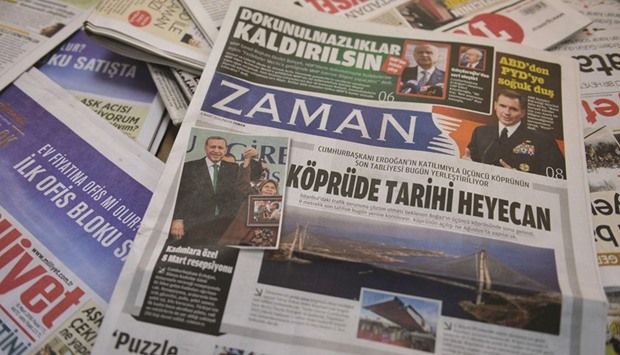A day after Turkey’s top-selling newspaper Zaman was taken over by the state, it dropped its criticisms of the government and published flattering stories on President Recep Tayyip Erdogan.
The episode is the latest twist in a long-running conflict between Erdogan and US-based Islamic preacher Fethullah Gulen.
Police raided the offices of Zaman, which is affiliated with Gulen, late on Friday after a court approved a request by a prosecutor to appoint a state administrator to the daily.
The prosecutor is investigating whether funds have been diverted to Gulen.
Zaman headlined an ambitious $3bn government project to connect Asian and European sides of Turkey’s mega city Istanbul by a third bridge.
In common with traditionally pro-government newspapers, the front page also contained images of the funerals of “martyrs” killed in the military clashes with Kurdish rebels in the southeast.
In one corner of the new edition Erdogan is seen holding the hand of an elderly woman and the newspaper announces the president is due to host a reception to mark International Women’s Day and his visit to the site of a bridge being built across Istanbul’s Bosphorus Strait.
There was no mention of protests by Gulen’s supporters on Friday and Saturday when police used tear gas and water cannon to disperse large crowds gathered outside of the newspaper.
Rights groups and European officials criticised the seizure, saying that it infringed on press freedom in the EU candidate country.
Prime Minister Ahmet Davutoglu, who is flying to Brussels for an emergency summit on refugees today, rejected that charge, saying that a legal process was under way to investigate illicit financing of a “terrorist” organisation and that there had been no political interference.
“There are many media outlets in Turkey that criticise our government. None of them are subjected to legal procedures,” Davutoglu told A Haber television yesterday.
“But what’s in question here is not merely a press activity but rather an operation targeting a legitimate government that came to power with popular support,” he said referring to Gulen loyalists.
Erdogan and Davutoglu accuse Gulen of plotting to topple their government in 2013 after police suspected of belonging to the religious movement leaked a corruption investigation into Erdogan’s family and ministers.
Gulen has been based in the US since 1999 when he fled charges against him laid by the former secular authorities.
Turkey has asked the United States to extradite him but Washington has shown little interest in doing so.
Davutoglu said that talks with the United States were under way “within the frame of international law” for Gulen’s extradition.
“I hope we will obtain a result as soon as possible,” the prime minister said.
Some 50 people stood outside of the paper’s Istanbul offices again yesterday, witnesses said. The atmosphere was calm.
Yesterday’s edition was a slim version of its previous self, at just 12 pages and with sparse content.
Zaman’s website was offline, with a message that read: “We will provide you, our readers, with a better quality and more objective service as soon as possible.”
“Internet has been cut off, we are unable to use our system,” one of the newspaper’s journalists told AFP. “The Sunday edition was not produced by Zaman’s staff.”
The website of the English-language Today’s Zaman, which was also confiscated, featured stories about the takeover and the EU’s critical response but had not been updated since Saturday.
Zaman’s editors were once largely supportive of Erdogan, who served as prime minister between 2003 and 2014 before winning the presidency, but differences emerged over foreign policy and a government plan to shut schools run by Gulen’s followers.
The paper’s editor-in-chief, Abdulhamit Bilici, was fired on Saturday, editors said.
In its last edition that went to print before its takeover, the newspaper warned of the “darkest days” in the history of the Turkish press.

A photo taken yesterday shows the front page of the first new edition of Zaman, which had staunchly opposed the president, now with articles supporting the government since its seizure by authorities.
